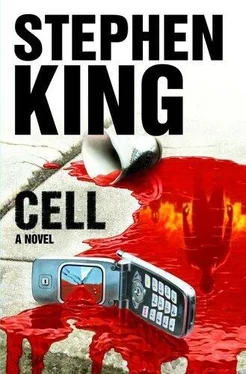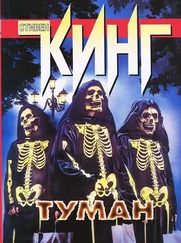Up ahead the two lines curved off to either side like turnpike exit ramps, one going into the tent on the left side of the road, one going into the tent on the right. They were the kind of long tents caterers put up to shade outdoor buffets on hot afternoons. Clay could see that just before each line reached the tents, the people were splitting into ten or a dozen shorter lines. Those people looked like fans waiting to have their tickets ripped so they could go into a concert venue.
Standing in the middle of the road at the point where the double line split and curved off to the right and the left, still wearing his threadbare red hoodie, was the Raggedy Man himself.
Left and right, ladies and gentlemen. Mouth not moving. Telepathy that was all jacked up, amped by the power of the flock. Move right along. Every one gets a chance to call a loved one before you go into the no-fo zone.
That gave Clay a shock, but it was the shock of the known—like the punchline of a good joke you'd heard for the first time ten or twenty years ago. "Where is this?" he asked the Raggedy Man. "What are you doing? What the hell is going on?"
But the Raggedy Man didn't look at him, and of course Clay knew why. This was where Route 160 entered Kashwak, and he was visiting it in a dream. As for what was going on . . .
It's phone-bingo, he thought. It's phone-bingo, and those are the tents where the game is played.
Let's keep it moving, ladies and gents, the Raggedy Man sent. We've got two hours until sunset, and we want to process as many of you as we can before we have to quit for the night.
Process.
Was this a dream?
Clay followed the line curving toward the pavilion-style tent on the left side of the road, knowing what he was going to see even before he saw it. At the head of each shorter line stood one of the phone-people, those connoisseurs of Lawrence Welk, Dean Martin, and Debby Boone. As each person in line reached the front, the waiting usher—dressed in filthy clothes, often much more horribly disfigured by the survival-struggles of the last eleven days than the Raggedy Man—would hold out a cell phone.
As Clay watched, the man closest to him took the offered phone, punched it three times, then held it eagerly to his ear. "Hello?" he said. "Hello, Ma? Ma? Are you th—" Then he fell silent. His eyes emptied and slackness loosened his face. The cell sagged away from his ear slightly. The facilitator—that was the best word Clay could think of—took the phone back, gave the man a push to start him forward, and motioned for the next person in line to step forward.
Left and right, the Raggedy Man was calling. Keep it moving.
The guy who'd been trying to call his mom plodded out from beneath the pavilion. Beyond it, Clay saw, hundreds of other people were milling around. Sometimes someone would get in someone else's way and there would be a little weak slapping. Nothing like before, however. Because—
Because the signal's been modified.
Left and right, ladies and gentlemen, keep it moving, we've got a lot of you to get through before dark.
Clay saw Johnny. He was wearing jeans, his Little League hat, and his favorite Red Sox T-shirt, the one with Tim Wakefield's name and number on the back. He had just reached the head of the line two stations down from where Clay was standing.
Clay ran for him, but at first his path was blocked. "Get out of my way!" he shouted, but of course the man in his way, who was shuffling nervously from foot to foot as if he needed to go to the bathroom, couldn't hear him. This was a dream and besides, Clay was a normie—he had no telepathy.
He darted between the restless man and the woman behind him. He pushed through the next line as well, too fixated on reaching Johnny to know if the people he was pushing had substance or not. He reached Johnny just as a woman—he saw with mounting horror that it was Mr. Scottoni's daughter-in-law, still pregnant but now missing an eye– handed the boy a Motorola cell phone.
Just dial 911, she said without moving her mouth. All calls go through 911.
"No, Johnny, don't!" Clay shouted, and grabbed for the phone as Johnny-Gee began punching in the number, surely one he'd been taught long ago to call if he was ever in trouble. "Don't do that!"
Johnny turned to his left, as if to shield his call from the pregnant facilitator's one dully staring eye, and Clay missed. He probably couldn't have stopped Johnny in any case. This was a dream, after all.
Johnny finished (punching three keys didn't take long), pushed the SEND button, and put the phone to his ear. "Hello? Dad? Dad, are you there? Can you hear me? If you can hear me, please come get m —" Turned away as he was, Clay could only see one of his son's eyes, but one was enough when you were watching the lights go out. Johnny's shoulders slumped. The phone sagged away from his ear. Mr. Scottoni's daughter-in-law snatched the phone from him with a dirty hand, then gave Johnny-Gee an unloving push on the back of the neck to get him moving into Kashwak, along with all the others who had come here to be safe. She motioned for the next person in line to come forward and make his call.
Left and right, form two lines, the Raggedy Man thundered in the middle of Clay's head, and he woke up screaming his son's name in the caretaker's cottage as late-afternoon light streamed in the windows.
3
At midnight clay reached the little town of north shapleigh. by then a nasty cold rain that was almost sleet—what Sharon had called "Slurpee rain"—had begun to fall. He heard oncoming motors and stepped off the highway (still good old Route 11; no dream highway here) onto the tarmac of a 7-Eleven store. When the headlights showed, turning the drizzle to silver lines, it was a pair of sprinters running side by side, actually racing in the dark. Madness. Clay stood behind a gas pump, not exactly hiding but not going out of his way to be seen, either. He watched them fly past like a vision of the gone world, sending up thin sprays of water. One of the racers looked like a vintage Corvette, although with only a single failing emergency light on the corner of the store to see by, it was impossible to tell for sure. The racers shot beneath North Shapleigh's entire traffic-control system (a dead blinker), were neon cherries in the dark for a moment, then were gone.
Clay thought again: Madness. And as he swung back onto the shoulder of the road: You're a fine one to talk about madness.
True. Because his phone-bingo dream hadn't been a dream, or not entirely a dream. He was sure of it. The phoners were using their strengthening telepathic abilities to keep track of as many of the flock-killers as they could. That only made sense. They might have a problem with groups like Dan Hartwick's, ones that actually tried to fight them, but he doubted if they were having any trouble with him. The thing was, the telepathy was also oddly like a phone—it seemed to work both ways. Which made him . . . what? The ghost in the machine? Something like that. While they were keeping an eye on him, he was able to keep an eye on them. At least in his sleep. In his dreams.
Were there actual tents at the Kashwak border, with normies lining up to get their brains blasted? Clay thought there were, both in Kashwak and places like Kashwak all over the country and the world. Business would be slowing down by now, but the checkpoints—the changing- points– might still be there.
The phoners used group-speak telepathy to coax the normies into coming. To dream them into coming. Did that make the phoners smart, calculating? Not unless you called a spider smart because it could spin a web, or an alligator calculating because it could lie still and look like a log. Walking north along Route 11 toward Route 160, the road that would take him to Kashwak, Clay thought the telepathic signal the phoners sent out like a low siren-call (or a pulse) must contain at least three separate messages.
Читать дальше








